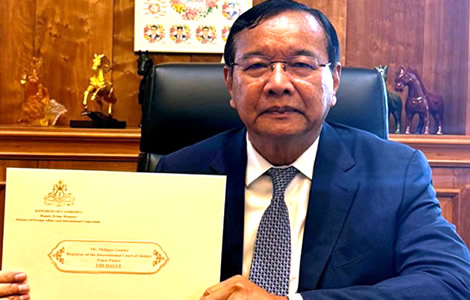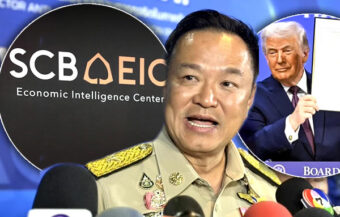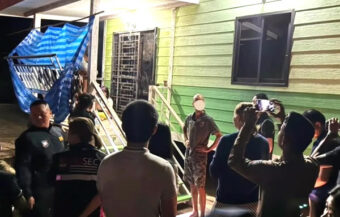Cambodia files complaint against Thailand at ICJ over disputed border zones after indecisive talks. Tensions remain, border trade is dampened and nationalism rises. Both nations brace for a long drawn out tussle. What happens next is unclear and unpredictable.
On Sunday, Cambodia formally filed a complaint against Thailand with the International Court of Justice (ICJ) in The Hague. This action coincided with the conclusion of the Joint Border Commission (JBC) meeting in Phnom Penh. In Bangkok, the Ministry of Foreign Affairs emphasised the positive atmosphere during the talks and announced plans for the 7th JBC session to be held in Bangkok this September. Despite this, the dispute has left the border between Thailand and Cambodia highly tense, severely restricting cross-border trade and commerce. Moreover, the conflict has created lasting political repercussions in both countries. Over the past 18 days, Thai-Cambodian relations have been put at serious risk. The pressing question now is: what will happen next?

The sixth Thai-Cambodian Joint Border Commission (JBC) meeting ended in Phnom Penh on Sunday, June 15. Although the atmosphere was described as cordial and cooperative, there was no resolution on the four most sensitive border areas.
Despite agreeing on several technical matters, Cambodia made it clear that bilateral talks had reached their limit. From now on, Phnom Penh stated, four key disputed zones will no longer be discussed within the JBC mechanism. This includes areas near Chong Bok, where tensions have recently escalated.
Instead, Cambodia filed a formal complaint with the International Court of Justice (ICJ) in The Hague. Deputy Prime Minister Prak Sokhonn announced the move on behalf of Prime Minister Hun Manet.
The joint border commission meeting ended with no resolution on four key disputed border areas
Cambodia is asking the ICJ to determine the rightful sovereignty over Ta Mone Thom, Ta Mone Touch, Ta Krabey, and Mom Bei. These are known in Thailand as Ta Muen Thom, Ta Muen Toch, Ta Kwai, and the Emerald Triangle.
Notably, Cambodia insisted that Thailand join the case at the ICJ for a peaceful and fair resolution. However, Thailand has not recognized the ICJ’s jurisdiction in this matter. This refusal could further complicate the already tense border negotiations.
In parallel, Cambodia reasserted its reliance on historical treaties and colonial-era maps. It emphasised that the correct map for demarcation is the 1:200,000-scale French-produced map from the early 20th century. These maps were referenced in the Franco-Siamese treaties of 1904 and 1907. Cambodia claims both sides agreed to use them under the 2001 Memorandum of Understanding (MoU).
Importantly, Cambodia refuses to accept maps unilaterally drawn by Thailand. Cambodian officials blame these Thai maps for ongoing confusion and dispute. According to Border Affairs Minister Lam Chea, the Thai maps contradict earlier agreements and international legal standards. Consequently, he asserted, they are the root cause of this prolonged border crisis.
Despite rising tensions, Cambodia stresses peace but shifts strategy by moving dispute to the ICJ
Though tensions are high, Cambodia stressed its preference for peace. Lam Chea stated that the government opposes any outbreak of war. Instead, he called for friendship, good cooperation and stability along the border.
At the same time, Cambodia’s move to the ICJ indicates a clear strategic shift. Meanwhile, on the Thai side, the Ministry of Foreign Affairs tried to highlight progress.
In a statement issued Sunday, the ministry said the JBC remains a vital tool. It emphasized that both sides agreed to continue talks and that Thailand will host the next JBC session in September. Indeed, both delegations reviewed several technical agenda items during the two-day meeting.
They examined the report from the Joint Technical Subcommittee’s July 2024 meeting in Siem Reap. Furthermore, they discussed revisions to the 2003 Terms of Reference (TOR) related to aerial mapping. Both sides also agreed to send joint teams to survey zones near previously agreed crossing points. Additionally, the delegations reviewed survey protocols for “Phase 6” areas.
These guidelines date back to earlier JBC discussions, including a special session in 2009. Sunday’s meeting ended with the signing of joint minutes and a general understanding to meet again in the fall.
Core dispute remains unresolved as border incident escalates tensions between Thailand and Cambodia
However, none of these agreements addressed the core problem. The heart of the dispute lies in incompatible claims over historical mapping and jurisdiction. And now, with Cambodia escalating the matter to the ICJ, the path forward appears even more complicated. The current flare-up follows a border incident on May 28 in the Chong Bok area of Thailand’s Ubon Ratchathani province.
Cambodian troops allegedly entered no man’s land, dug a trench, and refused to withdraw. This led to a brief military skirmish in which one Cambodian soldier was killed. Thai forces later imposed border measures, prompting the Cambodian troops to fill in the trench and retreat.
Following this incident, Cambodia initially agreed to discuss the issue under the JBC. However, the talks failed to deliver a concrete resolution. Cambodia’s subsequent ICJ filing suggests that military incidents could recur without a clear legal settlement.
Domestically, the issue has also impacted Thai politics. According to a nationwide poll by the National Institute of Development Administration (NIDA), the public is now more concerned with the border situation than with day-to-day politics. In particular, a speculated upon cabinet reshuffle allowing the Pheu Thai Party to seize the Ministry of the Interior.
Thai public shows more confidence in military than government over border dispute amid rising nationalism
Furthermore, 62.52% of respondents expressed high confidence in the Thai military’s ability to handle the dispute. In contrast, only 11.99% had high confidence in the government led by Paetongtarn Shinawatra.
When asked about the role of the Ministry of Foreign Affairs, the results were similarly sceptical. Over 66% of respondents expressed little or no confidence in the ministry’s ability to resolve the conflict. By contrast, the armed forces received significantly more public approval.
The poll also revealed a surge in nationalistic sentiment. Nearly 70% of respondents strongly supported the line from the national anthem that emphasizes peace but readiness for battle. Additionally, nearly half of respondents described themselves as highly nationalistic. Another third said their nationalism varied depending on the situation.
Therefore, the current crisis is having significant social and political consequences. For Prime Minister Paetongtarn Shinawatra’s administration, the dispute presents growing pressure. Many critics say the government must do more to reassure the public and assert Thai sovereignty. Meanwhile, the Cambodian government is seen to have benefited politically by taking a firm and legally strategic stance.
Joint Border Commission shows limited progress amid heightened legal dispute and ongoing border tension
Even so, the JBC process is not entirely stalled. Both parties signed the meeting’s final report and reaffirmed technical cooperation. They also agreed to work jointly on verifying certain mapped boundary segments. Thailand will now prepare to host the next JBC session in September 2025.
Yet, despite these formalities, Cambodia’s ICJ submission introduces a new legal front. If the court accepts the case, it could take years to resolve. It would also mean a shift away from diplomatic negotiation toward legal arbitration.
For now, military alertness remains high on both sides of the border. Border checkpoints face restrictions, affecting cross-border trade and local livelihoods. Several Thai provinces near the frontier have reported slowdowns in economic activity. Local officials in Ubon Ratchathani and Surin provinces have called for calm, but they remain on standby.
At the same time, Cambodian border communities have held pro-government rallies. These events promote support for the ICJ move and assert Cambodia’s claims. The demonstrations have been peaceful, but they reflect growing nationalism on both sides.
In summary, the JBC meeting ended with polite words but little substance. Cambodia’s decision to bypass bilateral talks on the core areas marks a turning point.
The involvement of the ICJ raises hopes for legal clarity but also risks increasing tensions in the short term. Previously, a ruling against Thailand by the court in 1962 has since inflamed antipathy towards Cambodia. Indeed, any judgment handed down by the court will likely have a similar impact.
Thailand and Cambodia face political and economic fallout as border dispute escalates under Hun Sen
Both governments now face a complex situation. In Thailand, the democratic government of Paetongtarn Shinawatra has been damaged and left isolated on this issue. In short, it has been forced to place the border in the hands of the military.
Cambodia outflanks Thailand again even as talks took place in Phnom Penh. Insists on ICJ court ruling
Rome wants electricity and internet cut off to areas of Cambodia along Thailand’s border to show strength
Thai-Cambodian border tensions left unresolved. Conflict is still on the table as visa periods for nationals are cut
On the other hand, the Cambodian government has raised nationalist fervour and support. However, it has damaged cross-border trade and economic ties with Thailand. Indeed, it has also strained goodwill between the two countries, which was previously at a high level.
Significantly, the rupture has also put an end to any prospects of cooperation between the two countries in pursuit of the 2001 Memorandum of Understanding (MOU) and energy reserves in the Gulf of Thailand.
Certainly, it is difficult to understand why this matter has escalated—reportedly at the hands of Cambodian strongman Hun Sen, who is seen as the architect of the affair. Furthermore, given the unpredictable nature of the Cambodian strongman, what comes next?
Join the Thai News forum, follow Thai Examiner on Facebook here
Receive all our stories as they come out on Telegram here
Follow Thai Examiner here
Further reading:
Dangerous impasse between Thailand and Cambodia as PM rules out International Court of Justice (ICJ)
Hun Manet confirms Cambodia ultimately may decide to send border dispute with Thailand to the Hague
Khmer soldier killed in deadly gunfire between Thai and Cambodian armies near Ubon Ratchathani


















